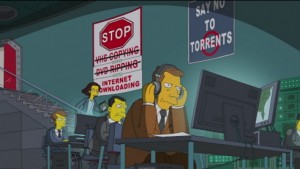Copyright is Ready for Primetime: Several Hours of Programming on Copyright Aired Last Night
Last night’s primetime lineup was filled with stories about copyright: (1) 60 Minutes interviewed the indicted Megaupload founder Kim Dotcom at 7, (2) the Simpsons played out a scenario of movie piracy at 8, and (3) the Good Wife litigated unauthorized derivative works at 9.

Source: TorrentFreak http://torrentfreak.com/the-simpsons-cleverly-cover-the-pirate-bay-anti-piracy-enforcement-140106/
While copyright may be on the minds of television writers and media producers more than most industries, this isn’t some industry conspiracy. (Note that the MPAA’s new in-house anti-piracy lawyer Steve Fabrizio recently told The Hollywood Reporter that “our industry is not seeking any legislation, and we don’t see any legislation on the horizon.”) Rather, producers have evidently concluded that the subject of copyright is relevant enough to resonate with viewers who have choices about what to watch. Perhaps the public outcry about SOPA—nearing its second anniversary—may have been a catalyst for these issues entering our national conversation. Regardless, these issues today play a greater role in people’s lives.
A few weeks ago, the USPTO and NTIA held an all-day public meeting on the Green Paper that they released in July. There were panels on statutory damages, the first sale doctrine, remixes, notice and takedown, and the government’s role in the online marketplace. A collection of DisCo’s live tweets from the event is available here. To some of our readers, these may be familiar terms and doctrines; to many others, they may seem highly arcane and technical.
The Green Paper public meeting directly touched all of the issues covered on TV last night. First of all, 60 Minutes interviewed Kim Dotcom, who potentially faces millions in statutory damages. CDT’s David Sohn pointed out on the first panel that statutory damages multiply risk, are often arbitrary, penalties can be cartoonish, and they complicate innovation, among other things. Without taking a position on the legality of the Megaupload service, these statutory damages are a significant deterrent to intermediaries and service providers.
Second, the Simpsons addressed illegal downloading and governments’ anti-piracy enforcement; TorrentFreak has a recap here. The episode also featured subtle digs about copyright holders’ tendency to try to eradicate new technologies throughout history, such as a sign on the wall of the FBI that reads: “STOP VHS COPYING DVD RIPPING INTERNET DOWNLOADING.” This sign could have included a lot more previous technologies, like piano player rolls; for an excellent piece cataloguing that controversy and the many others in the following decades, check out Nate Anderson’s Ars Technica 2009 classic “100 years of Big Content fearing technology—in its own words.” The Green Paper conference touched on these issues on the final panels about the government’s role in licensing. Our own Matt Schruers brought up that a key issue is providing access to lawful content. According to the TorrentFreak recap, the Simpsons episode hinted that part of the reason Homer pirates is that the legal options were not sufficient.
Finally, the Good Wife episode dealt with remix and derivative works, which were addressed in the third panel of the Green Paper meeting; Vulture has a recap here. As Prof. Peter DiCola mentioned during that panel, sampling and covers often involve inefficiencies and transaction costs. The episode addressed this, as the artists’ manager got the compulsory license, but not a derivative work copyright license. Also, this storyline appears to be based on a real controversy that involved Glee using Jonathan Coulton’s arrangement of Baby Got Back without permission. Not only did the story go viral when it happened (as have other recent copyright controversies, like the Beastie Boys-GoldieBlox fair use kerfuffle or the Shia LaBeouf plagiarism fiasco), but the writers found it interesting enough to dramatize to viewers. [Update, January 7: Vulture just published Jonathan Coulton’s thoughts on the episode (which he heard about on Twitter during the episode rather than through the Good Wife, and thus it was also without permission) and how it compares to his real-life situation; it’s available here.]
If this continues as a trend, it could even have some real-world policy implications. NPR’s This American Life episodes exposing patent trolls did a lot to expose that shady behavior and may have helped catalyze patent reform.








